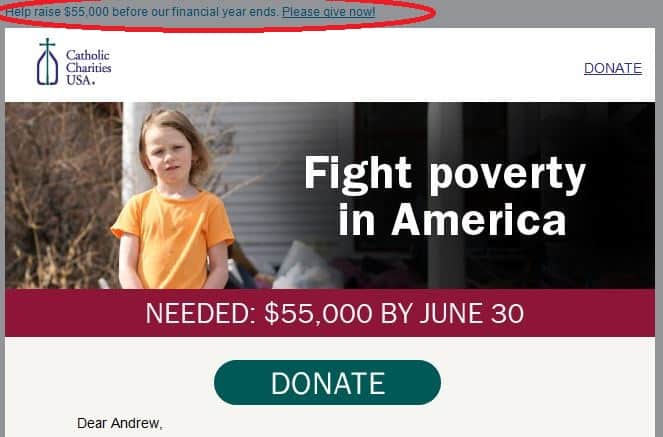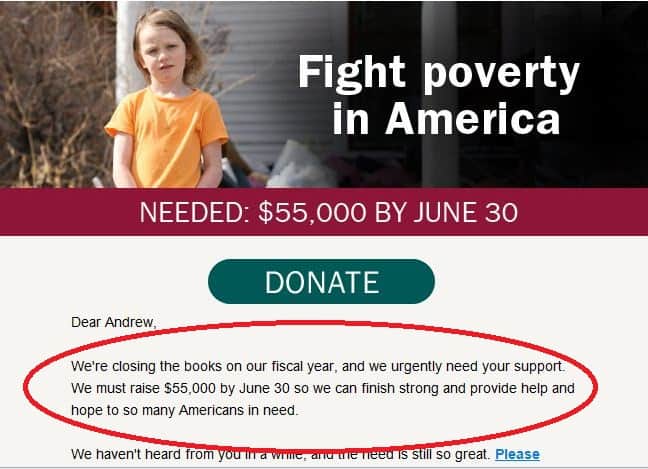Last month Marc A. Pitman wrote on the myth of donor fatigue. Something Marc said stuck with me, and hit home like a hammer when I got an email solicitation from Catholic Charities USA (below).
First, check out what Marc said on the topic of donor fatigue – the myths – and the realities:
Now take a look at the email solicitation I received from CCUSA recently. In my opinion, it’s the perfect example of crappily asking:
I’m all for setting campaign goals, but as you can see in the header area of this email, the goal for this campaign is painfully internally focused. Help raise $55,000 before our fiscal year ends. Please give now.
Nothing about that offer is donor focused. It doesn’t help me understand the true need faced by the people CCUSA serves. It doesn’t inspire me, doesn’t acknowledge my ongoing support, doesn’t share a compelling story to motivate me to give, and doesn’t even begin to communicate the impact my gift will make.
Unfortunately, it only gets worse in this solicitation.
The body of the email goes on to tell me, We’re closing the books on our fiscal year, and we urgently need your support. We must raise $55,000 by June 30 so we can finish strong and provide help and hope to so many Americans in need.
Providing help and hope sounds important. However, it’s entirely overshadowed by the fact that I’m now left wondering if they really need my help because they didn’t plan well, or maybe the overspent throughout the year and just don’t have appropriate fiscal controls in place? Maybe the need is greater than anyone anticipated, and they’re actually providing so much value across the country that they just must spend more money before the end of their fiscal year? But they never say that. So I’m left to tell myself a story…and that’s never where you want to lead your donors.
[bctt tweet=”Here are five examples of how you might be guilty of crappily asking your donors”], and what you should do to correct it:
- You’re institutionally-focused in your communications, instead of focused on your donor and the impact she makes in the community through her vision, compassion, and philanthropy.
- You rely on silly gimmicks like “end of fiscal year” campaigns, instead of using inspiring, meaningful campaigns that showcase the need faced by those you serve and clearly communicating how your donor can take action today to solve the problem.
- You ask and ask and ask, but fail to provide thoughtful, meaningful acknowledgment for your donors, like sending timely and relevant thank you letters, calling just to say thank you, or ensuring that your thank you letters are specific instead of generic.
- Your fundraising solicitations are all ask and no gratitude, instead of solicitations that balance appreciation and inspiration with need and solicitation
- You have a lot of people in your office who are responsible for soliciting or processing gifts, but no one who is singularly responsible for leading donor appreciation and managing donor experience.
The good news is, it doesn’t have to be this way. If you think you might be guilty of some of these, you can fix that right now by taking some of the simple steps identified above to improve the way you engage with your donors, and deliver them the experience they deserve.

